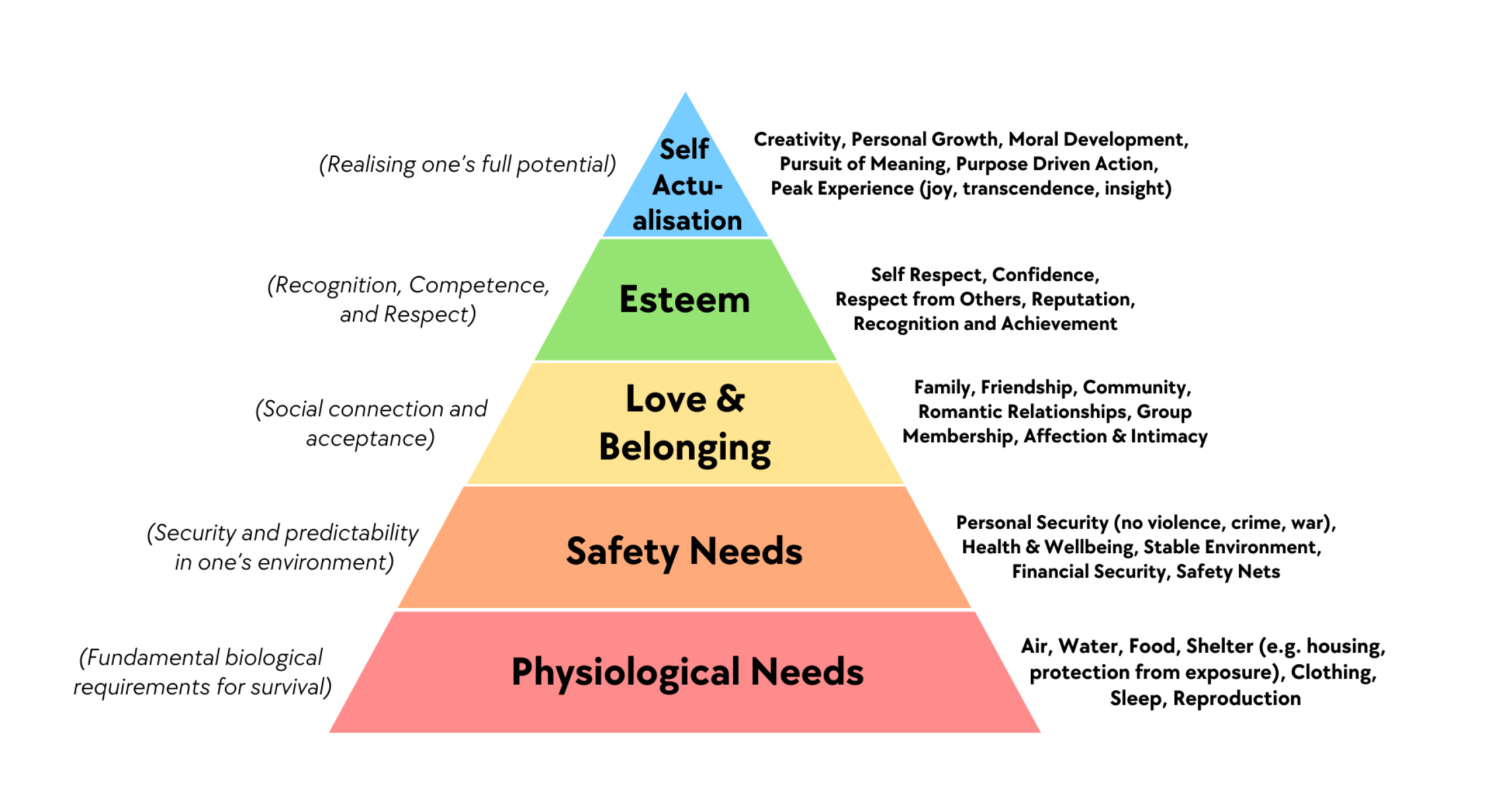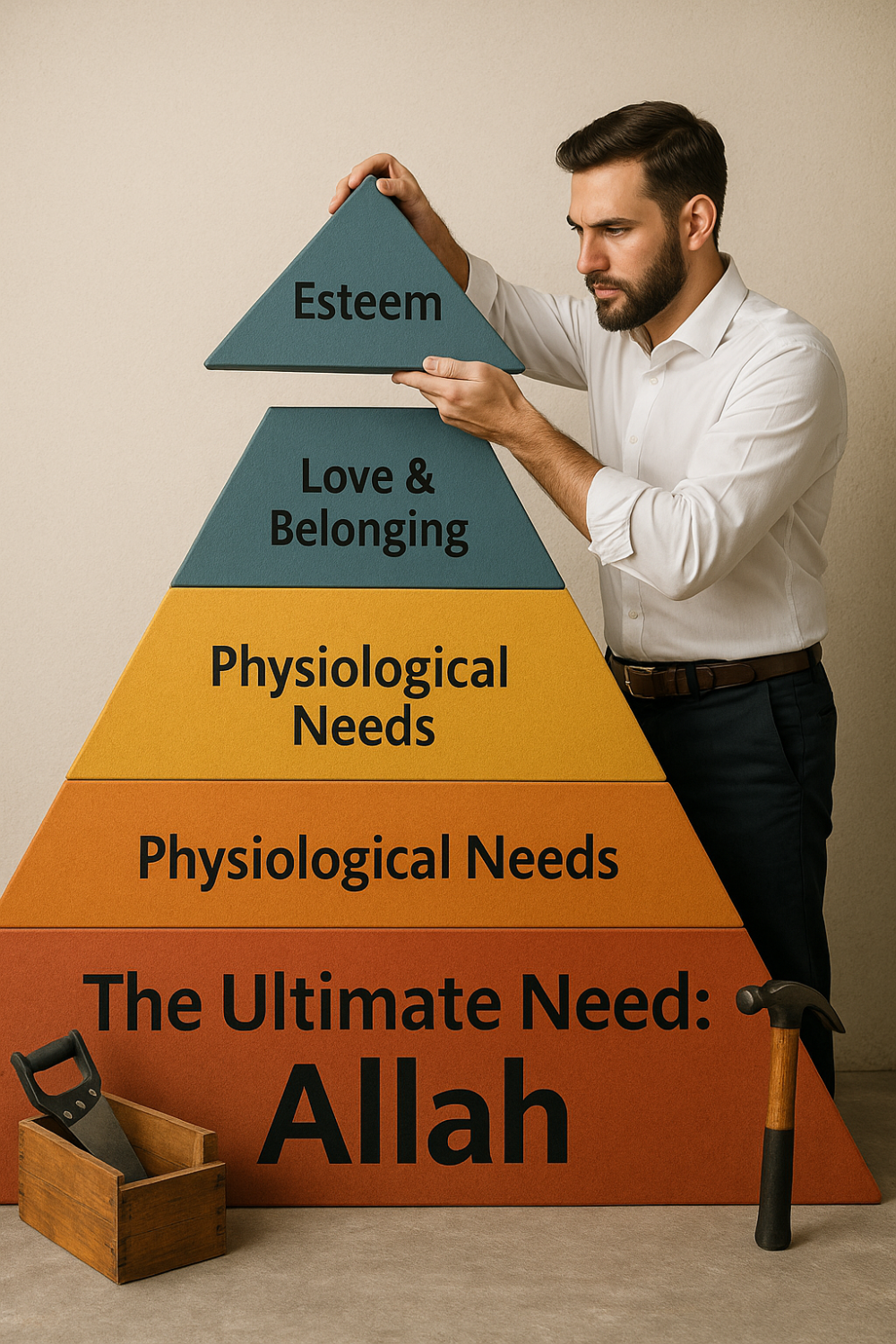In 1943, Abraham Maslow gave us his Hierarchy of Needs that outlined a five-stage pyramid, and it went on to become one of the most popular frameworks for understanding human motivation. Nearly every leadership, self-help, or management book, along with every second pitch deck I've seen in the last 6 months, makes mention of it.
The traditional pyramid begins with physiological needs at the base — food, water, shelter — and climbs through safety, love & belonging, esteem, and finally, self-actualization: becoming the “best version of yourself.”

But few know that before his death, Maslow revised it, adding a stage above self-actualization: self-transcendence, the pursuit of meaning beyond oneself. In the last years of his life (late 1960s), Maslow came to believe that self-actualization, becoming the “best version” of yourself, was not the highest human need. Through studying people he considered “self-actualizers,” he noticed many were driven to go beyond personal fulfillment, toward what he called self-transcendence. This meant seeking connection with a higher purpose, truth, or cause beyond the self — whether through altruism, spirituality, creativity, or service. He saw it as the pinnacle of psychological growth, and began incorporating it into lectures, writings, and unpublished notes before his sudden death in 1970.
As a faith-driven PM, this isn’t news to us. Self-transcendence isn’t an optional “final step” — it’s the starting point. It’s the base of our pyramid, the foundation that everything else rests upon. Our vision is not just to build a product, close a round, or capture market share — it’s to serve people sincerely for the sake of Allah ﷻ.

Did we just show that we need Allah more than we need food and water? Yes. Food and water nourish just the body for a period of time, whereas finding, knowing, and submitting to Allah is the ultimate need and aim of our life. It nourishes our body, soul, and mind.
The polymath Imam Ibn Taymiyyah رحمه الله said, “The remembrance of Allah for the heart is like water for the fish. What will be the state of the fish if it is taken out of water?” He put this into action throughout his life. His student, Imam Ibn al-Qayyim رحمه الله said, “Shaykh ul-Islam Ibn Taymiyyah would search a lot to find people to help them with their needs. This was because he knew that every time he helped someone, Allah would aid him.” [Rawdat al-Muhibbeen]
Our roadmap has already been laid out for us by the Messenger of Allah ﷺ, “Whoever relieves the hardship of a believer in this world, Allah will relieve his hardship on the Day of Resurrection. Whoever helps ease one in difficulty, Allah will make it easy for him in this world and the Hereafter. Whoever conceals the faults of a Muslim, Allah will conceal his faults in this world and the Hereafter. Allah helps the servant as long as he helps his brother.” (Muslim) In another narration, he ﷺ said: “The best of people are those who are most beneficial to people.”
Why Purpose Outlasts Profit?
In the startup world, the common narrative is about hustling for funding, scaling fast, and hitting those revenue milestones. But money alone is a flimsy fuel — it burns hot, then burns out. Teams driven solely by financial goals often face fatigue, burnout, and disengagement when the road inevitably gets rough.
The most resilient founders and teams are anchored in something bigger than themselves — a mission that transcends personal gain. When a startup’s purpose is rooted in solving a real problem, creating meaningful impact, or serving a higher cause, every challenge feels worth tackling. It shifts the mindset from “How can we make money?” to “How can we make a difference?” — and paradoxically, that’s when money follows.
This deeper vision shapes everything:
- Product-market fit improves because you’re obsessed with truly understanding the problem and serving people, not just chasing trends.
- Team engagement skyrockets because every role feels essential in advancing the mission.
- Resilience grows because setbacks are reframed as part of the journey, not signs of failure.
When founders embody this purpose, they attract like-minded people — those willing to put their best thinking, creativity, and energy into the work. Self-transcendence isn’t just the peak of personal growth; it’s the foundation of building teams and products that last.
Purpose in Action: Lessons from GlobalSadaqah
I have had the pleasure of working at GlobalSadaqah.com, a Social Finance Fintech platform, for over half a decade now. We've launched hundreds of campaigns and impacted millions of lives. The nature of this work often called for working odd hours, long hours, and even on weekends. But this is where the mindset, vision, and belief in the product came in handy.
One way of looking at it was that this is all part of your job, and you have to do it to make sure you get your salary at the end of the month. The better way to look at it was that even if I am putting in the extra work, at the end of the day, my work will help feed a family, change someone's life, or bring a smile to someone's face, and much more.
There needs to be healthy boundaries and a good work-life balance, of course. The point here was to highlight a mindset shift. Not everyone might have the opportunity or the nature of work that I mentioned above. That is why, in this article, I want to focus more on the mindset of founders and their teams, irrespective of the industry or the nature of our role in the team.
The Unseen Engine: Niyyah
Naturally, we begin with why we started building our product or solution in the first place. In our tradition, niyyah or intention is the unseen engine that powers our work. It is the ultimate life hack. The Messenger of Allah (ﷺ) said, "Actions are (judged) by intentions, so each man will have what he intended." [Bukhari]
Any action that is done needs to have an intention behind it. Without the proper intention, no matter how mighty the action, its value can be turned to dust. With the proper intention, the smallest of deeds can be turned into mountains. The early generations (salaf) would sometimes pause before an action to actively refine their intention, knowing that with the right sincerity, the smallest effort could carry the greatest weight in the sight of Allah. Zayd Ash-Shami said: "Verily, I like to make an intention for everything I do, even if it is eating and drinking." Always check your niyyah to get the most rewards. Imam Aḥmad said: “Before you do anything, check your niyyah – ask yourself before performing an action, ‘Is this for the sake of Allah?’” This is the ultimate life hack. This is your passive reward stream.
Imam Ibn al-Qayyim said, "The most exclusive group of people who get close to Allah are those who change the nature of their permissible deeds into acts of obedience to Allah." [Madaraj al-Salikin]
In your next team meeting or daily standup, try incorporating the renewal of a good intention to power your day.
A person needs to have knowledge before. A person must have the intention to do an act which is proper or, at least, permissible. The person cannot have such an intention unless he first knows that the act is proper or permissible. The Messenger of Allah ﷺ said, “Seeking knowledge is an obligation upon every Muslim.” [Ibn Majah] Commenting on this, Imam Abdullah Ibn al-Mubarak said, “A man must not proceed to do anything except upon knowledge; he is to ask and learn. This is what is obligatory upon people as regards learning knowledge.” This highlights to us the importance of having a strong foundational learning as a team, continuous R&D, as well as a strong Shariah Advisory to guide all the product innovations and solutions that we come up with.
It will take time and effort to get into the habit of refining our intentions to maximize our rewards. Till then, here's another hack from Mufti Shafi Usmani رحم الله who wrote, "Veritably, 'Bismillah' - بسم الله - In the name of Allah is the legendary Philosophers Stone which transmutes, not copper, but mere dust into the purest of gold"
For a founder or leader, this transforms the way you build. When your niyyah is to serve and benefit, every design sprint, every product iteration, and every customer interaction becomes an act of worship. It unites the team around a purpose far greater than financial gain — and that purpose fuels creativity, resilience, and excellence.
The All-Encompassing Framework: Maqasid al-Shariah
For those looking to go deeper, we have Maqasid al-Shariah. It refers to the reason why the Shariah exists or for the purpose the Shariah was revealed. It is formed by the unification of two words: Maqasid and Al-Shariah. Maqasid is the plural form of Maqsad or Maqsid, which is derived from the word Qasada (قصد), which refers to heading towards a direction or having an intention to do something. Al-Shariah linguistically refers to the path that is followed by the water springs. Technically, it is the path or a system that is sanctioned by Allah to govern all the aspects of the human life which is derived from the Qur'an and Sunnah.
Allah says,
ثُمَّ جَعَلْنَـٰكَ عَلَىٰ شَرِيعَةٍۢ مِّنَ ٱلْأَمْرِ فَٱتَّبِعْهَا وَلَا تَتَّبِعْ أَهْوَآءَ ٱلَّذِينَ لَا يَعْلَمُونَ
Now We have set you (O Prophet) on the (clear) Path of faith. So follow it, and do not follow the desires of those who do not know (the truth). [Surah al-Jathiyah, 18]
This definition shows us that Shariah is a comprehensive system that is related to every aspect of our lives. It is part of our products, our brainstorming sessions, our medicine, our marriages, our politics, as well as everything in our day-to-day life. It is not restricted to only that which happens inside the Masjid or just the judicial system. It is an all-encompassing system from Allah for us to follow. The main purpose of our creation is to worship Allah. The main purpose of the Shariah is to make life easy for us. This is irrespective of our being able to perceive this ease or not.
All the qawaid (principles) and maqasid (objectives) of the Shariah can be summarised into the principle:
جَلْبُ المَصَالِحِ وَدَرْءُ المَفَاسِدِ
Bringing benefits and preventing harms
It reflects the underlying wisdom of Islamic rulings, which aim to maximize benefits (المصالح) and minimize or eliminate harm (المفاسد) in human affairs. An additional emphasis was placed on eradicating and preventing harm. Allah's Messenger (ﷺ) said, “There should neither be harming (of others without cause) nor reciprocating harm (between two parties).” [Ahmad].
The Legacy You Leave
In a startup driven by this foundation, success is measured in both this world and the next. Profit is not abandoned — it is elevated, purified, and put in service of something higher. That’s how you build products that truly fit, teams that stay inspired, and a legacy that outlives you.













